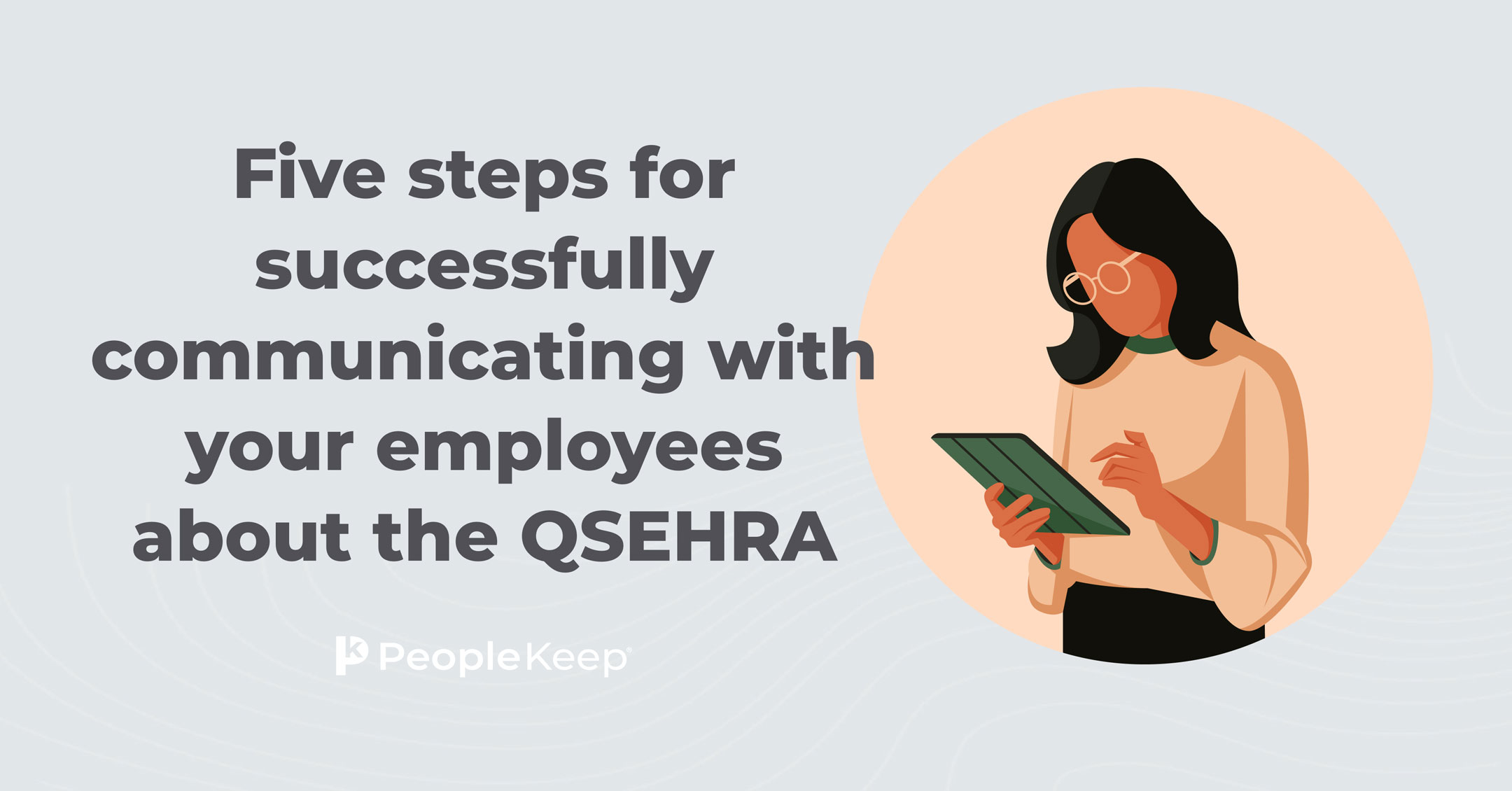6 FAQs on QSEHRA reimbursement
By Caitlin Bronson on March 17, 2017 at 11:45 AM
In December 2016, Congress revised and revived a popular employee benefits option: the health reimbursement arrangement (HRA). Many users of the new qualified small employer health reimbursement arrangement (QSEHRA), or small business HRA, have never administered a reimbursement plan, though, and have questions on how to process employee reimbursement requests while staying compliant with the law.
We’ve compiled six of the most commonly asked questions on QSEHRA reimbursement to make sure you and your employees are comfortable with your new benefit. We’ll also go over what could lead to improper reimbursement, the consequences of improper reimbursement, and how to address improper reimbursement without incurring tax fines.
1. How do I verify minimum essential coverage (MEC)?
QSEHRA administrators are not required to know or check whether employees have minimum essential coverage (MEC). Employees, however, are required to know when they have MEC to correctly file their income taxes. For more information on MEC and employees, read: "How the QSEHRA works for employees without minimum essential coverage" and "What are the W-2 requirements for a QSEHRA?"
2. How do I request reimbursement for premiums when I receive a premium tax credit?
Employees receiving a premium tax credit should thoroughly understand how their tax credit coordinates with their monthly allowance from the QSEHRA, as well as how to submit their premium for reimbursement.
First, the employee’s premium tax credit is reduced dollar-for-dollar by the total of the monthly allowance. For example, if an employee’s premium tax credit was $300 and their monthly allowance was $200, they would be eligible for only $100 of the premium tax credit.
Second, the employee must request reimbursement for only the portion of the premium they paid themselves. That means the total premium amount requested cannot include the portion paid by the premium tax credit. For example, if the employee receives a $100 premium tax credit for a $400 premium, the employee can submit a reimbursement request for only $300—not the full $400.
To do otherwise would lead to improper reimbursement.
3. What does it mean to self-attest to medical expense verification?
In addition to premiums, a QSEHRA can reimburse employees for qualified out-of-pocket medical expenses. In order to submit these expenses, employees must self-attest that the expenses are valid.
That means the employee agrees not to submit reimbursement for a medical expense that isn’t qualified under IRS Publication 105 or that they—or anyone else covered under their policy—didn’t actually incur.
While some improper reimbursements are intentional fraud, most of the time, employees are just confused about what qualifies for reimbursement. Again, employees should remember that they may only submit expenses they paid out of pocket. They cannot claim any portion of the expense paid by any other group or institution.
For example, if an employee received a 10 percent discount on their bill from their healthcare provider, the employee cannot claim reimbursement for the entire bill—only for the 90 percent they paid.
4. How can I avoid duplicate reimbursement requests?
If an employee incurs a qualifying expense, they may only submit that expense for reimbursement once.
While this seems straightforward, some employees become perplexed after receiving multiple documents from their healthcare provider. After a visit to the hospital, for example, an employee could receive a bill for services as well as an explanation of benefits (EOB) from the provider, which outlines which portions of the bill were paid by the insurer and which were paid by the employee. In confusion, the employee may submit both the bill and the EOB for reimbursement, thereby receiving a duplicate reimbursement for the same service.
This constitutes an improper reimbursement.
5. What rules apply to married couples who are both benefit eligible?
If you employ a married couple or an employee whose spouse also receives an HRA allowance through their employer, there may be confusion on how the couple should submit reimbursement requests.
Married couples in this situation must understand that when an expense is incurred, spouses should ensure they aren't being reimbursed twice for the same amount.
For example, both spouses can submit premiums for the family health insurance policy as long as the total amount reimbursed doesn't exceed the total amount of the premium.
To do otherwise would lead to improper reimbursement, so it’s very important that married couples communicate with each other on how they will handle requests.
6. Can a QSEHRA reimburse my spouse’s group health insurance contributions?
Many married employees are eager to know how the QSEHRA will help their spouse. While the HRA does much for spouses, there are some limitations.
The HRA allowance can reimburse a spouse’s out-of-pocket medical costs as well as premiums for an individual policy (remember, however, that premiums on a family plan may only be submitted once). If the spouse is on their employer’s group health insurance plan, however, there are restrictions.
If the employee’s spouse pays their contribution to the group plan on a post-tax basis—that is, if the contribution does not come out of their paycheck before tax—the QSEHRA can reimburse the spouse. However, if the spouse pays their contribution pretax, the HRA allowance cannot apply.
Receiving reimbursement for unqualified expenses on behalf of a spouse constitutes an improper reimbursement.
Preventing and correcting improper reimbursement
The consequences of improper reimbursement can be serious. First, the employee who was improperly reimbursed could be subject to tax penalties whether the payment was requested intentionally or not. Second, if improper reimbursements are discovered during an audit, the company’s entire HRA could be declared noncompliant. This would subject the company and each of its employees to tax fees.
Of course, the best way to avoid improper reimbursement issues is to prevent them. Because you and your employees are likely new to health insurance reimbursement, you’ll need the education to ensure everyone understands what can and cannot be submitted for reimbursement.
If an employee does receive an improper reimbursement, it’s important to know how to respond.
According to Revenue Ruling 2003-43, if your company identifies an improper reimbursement, you can take the following steps, in order:
- Require the employee to pay back the full amount of the improper reimbursement. The amount will then go back to the HRA.
- Withhold the amount of the improper reimbursement from the employee’s wages or other compensation. Be sure to check your rights, though, as some states prohibit this practice unless the employee consents.
- Deduct the amount of the improper reimbursement from the employee’s future reimbursement requests until the amount is accounted for.
Once you’ve recovered the improper reimbursement, take steps to prevent its recurrence. Again, education for both employees and the HRA administrator is key.
Start by communicating clearly on each of these six points, and respond quickly to any questions from employees. With the right effort, everyone will get on the same page, and administering the QSEHRA will be a breeze.
Check out more resources
See these related articles

What is a QSEHRA?
Looking for information on QSEHRAs? This guide provides a clear understanding of qualified small employer health reimbursement arrangements (QSEHRAs).

QSEHRA eligible expenses: What can you reimburse with a QSEHRA?
Discover which medical expenses are eligible for reimbursement under a QSEHRA. Learn what qualifies and how to maximize your health benefit.

5 steps for successfully communicating with your employees about the QSEHRA
Need help communicating your QSEHRA notice to employees? This guide provides five steps to communicate the benefits and requirements of the QSEHRA.


